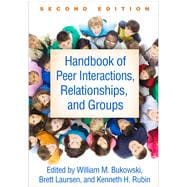The definitive handbook on peer relations has now been significantly revised with 55% new material. Bringing together leading authorities, this volume presents cutting-edge research on the dynamics of peer interactions, their impact on multiple aspects of social development, and the causes and consequences of peer difficulties. From friendships and romance to social withdrawal, aggression, and victimization, all aspects of children's and adolescents' relationships are explored. The book examines how individual characteristics interact with family, group, and contextual factors across development to shape social behavior. The importance of peer relationships to emotional competence, psychological well-being, and achievement is analyzed, and peer-based interventions for those who are struggling are reviewed. Each chapter includes an introductory overview and addresses theoretical considerations, measures and methods, research findings and their implications, and future directions.
New to This Edition
*Chapters on neuroscience, social media, social inequality, prosocial behavior with peers, and sociological approaches.
*Expanded coverage of applied issues: chapters on interventions for socially withdrawn children, activity programs that promote positive youth development, and policy initiatives.
*Chapters on same- and other-sex peer relationships, peer influence, educational environments, evolutionary models, the self-concept, personality, and animal studies.
*Increased attention to variations in peer relations due to culture, gender, and race.
*Many new authors and topics reflect a decade's worth of theoretical and methodological advances, including the growing use of complex longitudinal methods.
New to This Edition
*Chapters on neuroscience, social media, social inequality, prosocial behavior with peers, and sociological approaches.
*Expanded coverage of applied issues: chapters on interventions for socially withdrawn children, activity programs that promote positive youth development, and policy initiatives.
*Chapters on same- and other-sex peer relationships, peer influence, educational environments, evolutionary models, the self-concept, personality, and animal studies.
*Increased attention to variations in peer relations due to culture, gender, and race.
*Many new authors and topics reflect a decade's worth of theoretical and methodological advances, including the growing use of complex longitudinal methods.








